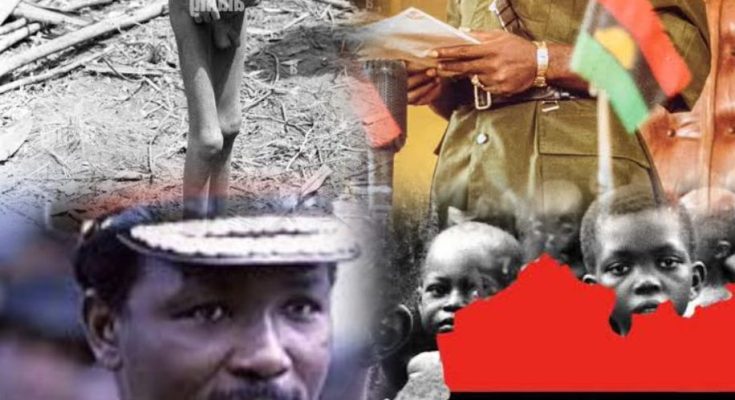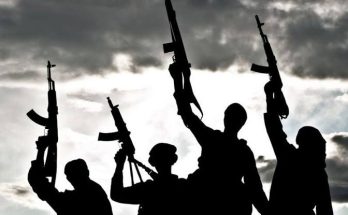By ADAEZE ANAH ESQ.
Ladies and gentlemen, Igbo Nwem, Umunnem na Umunnam, esteemed guests, as we gather today to commemorate the 54th anniversary of the end of the Nigerian Biafran War, we are reminded not only of the solemnity of the occasion but also of the resilience and spirit of us as a people who endured its trials. It is a privilege to be before you on this historic day, reflecting on our past with an eye towards a greater future.
As I commence with this presentation, it is important to note that the contents, opinions, and recommendations herein expressed are premised on the presumption that the Igbos of South-eastern Nigeria are and will continue to be part of the Federal Republic of Nigeria. With this in mind, I find relativity in the words of Mark Twain famously remarked, “History doesn’t repeat itself, but it often rhymes.” In the echoes of our collective past, we find the cadence of our present challenges and the potential verses of our future endeavours.
More still, it is important to note that our conversation today will not chiefly address the politics that led to the war. To do this would be very distracting, steering us away from the essence of this discussion. It will lean heavily on a tapestry of recollections of violations of human rights from the Biafran War. We will not merely dwell on our scars but envision our honest healing and hopefully, commit to it.
With that spirit in mind, let us delve into the depths of memory, not as passive spectators but as active participants, for it is in our engagement with the past that we chart the course for a more enlightened and compassionate future.
Brief Overview of Violations in the War. 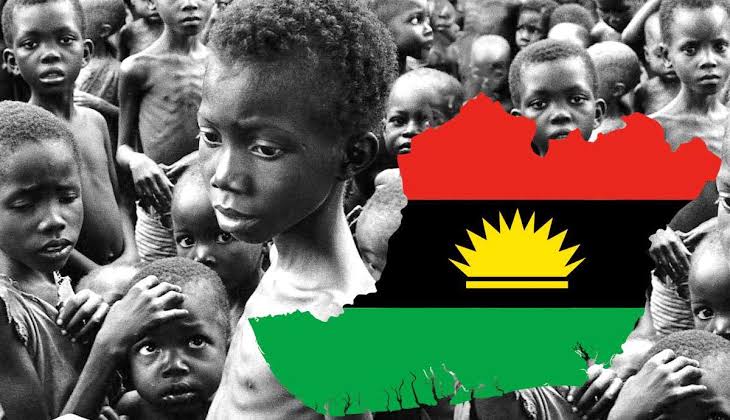 The violations suffered by the Igbos and other minorities in now-defunct Biafra have taken center stage in numerous political discussions in Nigeria and beyond for decades. It has been the theme of numerous biographies, autobiographies, commentaries, and controversies. Though all these have provided us with divergent accounts of the war, they have also kept the subject in the public consciousness.
The violations suffered by the Igbos and other minorities in now-defunct Biafra have taken center stage in numerous political discussions in Nigeria and beyond for decades. It has been the theme of numerous biographies, autobiographies, commentaries, and controversies. Though all these have provided us with divergent accounts of the war, they have also kept the subject in the public consciousness.
Despite the intense agitation discourses on the war rouses, there has been a reluctance to examine violations suffered by the people of the defunct Biafra through a human rights lens. The subject predominantly focuses on the political actors of the Nigerian-Biafran War, which robs the conversations of victim-centric attention and the corresponding remedial components a human rights approach would offer.
One reason the human rights perspective is quite unpopular is because it makes the conversation a utilitarian one, elevating the everyday people of the defunct Biafra over all the political and military actors in the war. Whilst the political history of the war is essential, a human rights perspective deflates the need to confer or rescind heroism on political players. It neither seeks to venerate or reprove a side nor does it feed a competition for an exalted place in history.
This makes this approach less lucrative as the “returns on investment” from such an exercise are collective and cannot be ascribed to a person or group. A solid human rights perspective is anchored in law and truth and these are two unyielding elements that will be further discussed herein.
Perhaps the most undesirable feature of the human rights perspective is that once it is established that there are violations of humanitarian principles and human rights of persons under a legal regime, an obligation to make available the truth about those violations and provide remedy for the sufferings of the victims is also established against the state. Undischarged obligations trigger a legal standing for victims and concerned persons or groups to demand accountability and justice. In essence, analysing Nigerian – Biafran was through the human rights lens is the most viable way to disrupt the denialism of the Nigerian Government and the International System regarding the violations suffered by the people of defunct Biafra. It opens up the possibility of reparations and remedies for victims of violations and gives room for demand for accountability. With this being said, two pertinent questions beg to be answered; “Did the Federal Government of Nigeria commit acts constituting violations of humanitarian and human rights laws against the people of the defunct Biafra? And is there a legal basis for the Nigerian Government to be held accountable for these violations?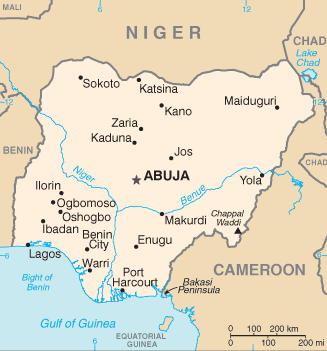 The Federal government of Nigeria committed acts that unequivocally violated humanitarian and human rights laws. These violations trigger an obligation on the part of the Nigerian Government to provide remedies. These obligations are anchored on remedy as required by Article 2 (3) of the ICCPR. These obligations remain undischarged and the violations against the people of the defunct Biafra continue to date producing a more complicated problem that stunts the corporate growth of the region. Below are highlights of these violations to provide a foundational context for our conversation.
The Federal government of Nigeria committed acts that unequivocally violated humanitarian and human rights laws. These violations trigger an obligation on the part of the Nigerian Government to provide remedies. These obligations are anchored on remedy as required by Article 2 (3) of the ICCPR. These obligations remain undischarged and the violations against the people of the defunct Biafra continue to date producing a more complicated problem that stunts the corporate growth of the region. Below are highlights of these violations to provide a foundational context for our conversation.
During the war, the Nigerian army unleashed attacks on civilians, the wounded, and their caregivers, who posed no threat to Nigerian troops. Unarmed civilians were killed en masse in several civilian areas such as markets, schools, churches, and hospitals where the wounded and the sick were not spared from air bombardments, infantry attacks, and pillage. Professor Chika Anyasodo, who supervised the mass burial of victims, recounted the 1969 air bombardment by a Nigerian aircraft on Afọ Umuọhiagu market reporting that more than 3,000 people were killed, of whom ninety percent were women.
In The New York Times, “Americans for Biafran Relief” took out a full-page ad on 10 July 1969 to notify the world about these horrendous killings, stating that “The war in Biafra has brought out a ‘sophisticated’ aspect of human nature that must make God sick. Horror, accompanied by good manners, is acceptable behavior. …This noble war has killed more children than soldiers.” More still, Emmanuel Okocha chronicled in detail the horrendous carnage and destruction of properties in Igbo towns in Midwestern Nigeria by the Nigerian military. These acts are not mere wrongdoings meant to throw us corporately into a mood swing now and then, but violations against humanitarian rules of war as enshrined in the Geneva Conventions of 12 August 1949, which provided more elaborate Protection for Victims of Non-International Armed Conflicts (Protocol II) was adopted and endorsed by Nigeria in 1961.
The most emblematic of persecutions signaling the specific intention to wipe out the Igbo race which has received no attention from the Federal Government of Nigeria are the Acts of Genocide committed against the Igbos during the war. This agenda was brazenly promoted and executed, so much so that it was advertised through mass media. For Instance, The New York Times reports that the theme song of Radio Kaduna, a government-controlled radio station, 1967-1970 contained the following inciting lyrics “Let us go and crush them. We will pillage their property, rape their women folk, kill off their men folk and leave them uselessly weeping. We will complete the pogrom of 1966”.
The use of starvation as a weapon of war is perhaps the most striking genocidal act inflicted by the Nigerian government on civilians in the defunct Biafran territories. This is because it was not a clandestine move but a policy of the Nigerian Government, defended by principal actors in the Gowon administration. Chief Obafemi Awolowo, SAN as Federal Minister of Finance and Vice Chairman of the Federal Executive Council infamously stated that “All is fair in war and starvation is one of the weapons of war. I don’t see why we should feed our enemies fat, only to fight us harder”.
About One Million children died from starvation and kwashiorkor due to this policy. The Prevention of caregivers and medical personnel from taking care of wounded, sick, and vulnerable civilians was another policy of the Nigerian government that constituted a constructive attack on the disadvantaged, inevitably leading to epidemics, and preventable civilian casualties in the defunct Biafra.
Of all the genocidal attacks on Ndi Igbo, the most telling of the specific intent to decimate the Igbo Civilization were the killings that happened outside the secessionist’s territory. In Asaba, hundreds of civilians gathered to welcome the Nigerian soldiers with their festive dance to demonstrate their support for a united Nigeria; nevertheless, they were all executed on the spot. Men and boys in the town were ordered to dig their graves before they were shot, and others were led to designated execution grounds like river banks and shot there. The slaughter of men and boys is particularly significant as it exposes a deliberate attempt to extinguish the Asaba civilization by cutting off its male population bearing in mind that they are culturally and spiritually regarded as the progenitors of that civilization. The fact that the Igbos of Midwestern towns did not support the secession did not earn them the protection of the federal government; instead, their ethnic identity trumped their patriotism and condemned them to a tragic fate. Reports suggest that about 1,000 persons died in these killings.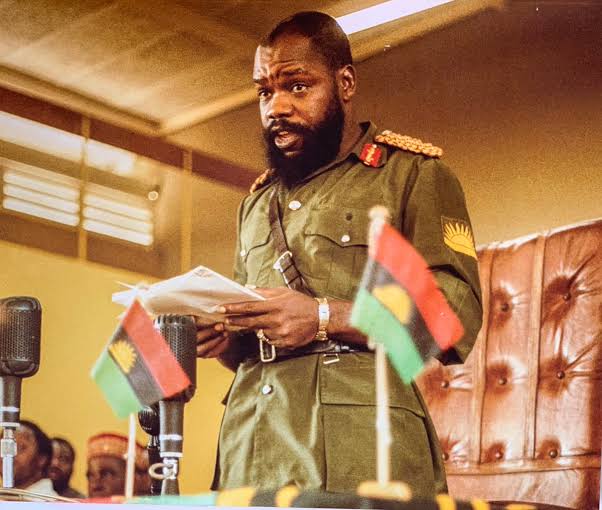 Assertions of genocide against the Igbo people of eastern Nigeria evoke varied reactions. The Nigerian government denied the commission of violations and dismissed reports as “Igbo propaganda” driven by the desire to elicit sympathy from the international community. The British government supported the Nigerian position and the United Nations reinforced it. To date, there have been no formal investigations from the United Nations on the claims of genocide in Biafra. Nevertheless, the unimpeachable horror of the genocidal attacks compelled world leaders including those of countries that were lending their support to the Nigerian side to condemn the killings and acknowledge that it was genocide. In the U.S., Richard Nixon and Edward Kennedy both condemned the starvation and blockade of access to humanitarian aid to civilians and firmly addressed the situation as genocide. His Holiness Pope Paul VI dispatched a fact-finding mission led by Monsignor Georges, which determined that genocide had been committed against the peoples of eastern Nigeria. The American Committee to Keep Biafra Alive, Caritas, and The Baha’i Faith all lent their voice strongly to the cause. These developments continued to attract more attention and elicited demands for a halt to the denial of access to humanitarian aid agencies but these entreaties fell on deaf ears and hard hearts.
Assertions of genocide against the Igbo people of eastern Nigeria evoke varied reactions. The Nigerian government denied the commission of violations and dismissed reports as “Igbo propaganda” driven by the desire to elicit sympathy from the international community. The British government supported the Nigerian position and the United Nations reinforced it. To date, there have been no formal investigations from the United Nations on the claims of genocide in Biafra. Nevertheless, the unimpeachable horror of the genocidal attacks compelled world leaders including those of countries that were lending their support to the Nigerian side to condemn the killings and acknowledge that it was genocide. In the U.S., Richard Nixon and Edward Kennedy both condemned the starvation and blockade of access to humanitarian aid to civilians and firmly addressed the situation as genocide. His Holiness Pope Paul VI dispatched a fact-finding mission led by Monsignor Georges, which determined that genocide had been committed against the peoples of eastern Nigeria. The American Committee to Keep Biafra Alive, Caritas, and The Baha’i Faith all lent their voice strongly to the cause. These developments continued to attract more attention and elicited demands for a halt to the denial of access to humanitarian aid agencies but these entreaties fell on deaf ears and hard hearts.
A state’s lack of recognition of a violation does not diminish its status as a human rights breach. A wrongdoing is a breach of one’s human rights when it conflicts with the innate standards of humanity and standards established by the community of nations (i.e. customary international law). It must contravene a positivist law that embodies customary international norms. According to the Genocide Convention, the actions of the Nigerian government and its military amounted to genocide against the Igbo people in the war. It does not matter that the heavyweights do not acknowledge it, it is what it is. Fifty-two years later, the Rwandan Genocide which happened more than three decades after the Genocide in the Nigerian-Biafran war and recorded considerably lower casualties (800,000 as opposed to the about 2,000,000 deaths in defunct Biafra) has not only received massive attention from the global human rights system and the International Community at large and has become the ultimate symbol of justice, it has become the universal symbol of the fight against genocide. Whilst I find this certainly questionable, it would be dishonest not to give the Rwandan people for this “success” because we can all agree that they have done a good job of memorializing that genocide.
Legacies of the Nigerian- Biafran War.
The Nigerian – Biafran war ended in 1970 but the effect of that war continues to rear its head and affect the experiences of Ndi-Igbo as Nigerians. Herein are some of the ways the politics and violations from the war continue to affect the lives of Ndi-Igbo.
1. Stigmatization: Ndi–Igbo suffer stigmatisation because of the perception that Igbos are either saboteurs from attempting to secede, sore losers, or toothless bulldogs given the politics and outcome of the war. This stigmatization is deeply woven into the fabric of Nigerian pop culture. Even children who were born decades after the war are not spared from the taunting we all endure as people who survived the war. This depletes our confidence as a people and puts a burden on us to sometimes prove that we matter. We may prove ourselves by striving for excellence and shattering ceilings in different disciplines (an inclination we should encourage) or by the recent trend of exhibiting opulence. Either way, the stigmatization we suffer can be likened to salting an unhealed injury as it damages our corporate psyche as a people.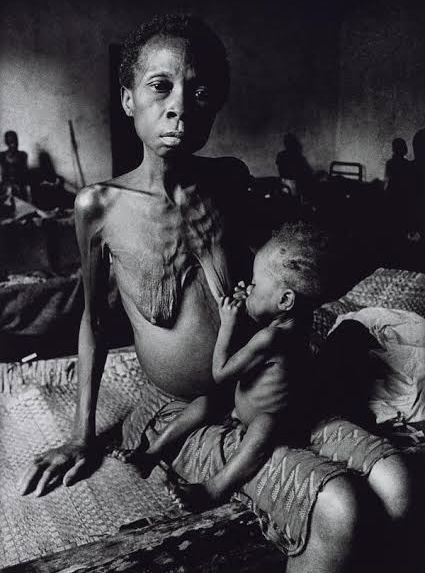 Another profound manifestation of this stigmatization is the reluctance and in some cases outright refusal of some Igbo communities in the minority in the south-south to identify as Igbos. This is against unimpeached history showing that these communities are of Igbo descent. These disassociations became popular after the war showing how inelegant it is perceived to be Igbo in the Nigerian space.
Another profound manifestation of this stigmatization is the reluctance and in some cases outright refusal of some Igbo communities in the minority in the south-south to identify as Igbos. This is against unimpeached history showing that these communities are of Igbo descent. These disassociations became popular after the war showing how inelegant it is perceived to be Igbo in the Nigerian space.
2. Marginalization: Ndi–Igbo continue to suffer relegation to less relevant political and administrative planes following the war. Federal appointments especially appointments are recurrently skewed against the south-eastern states. This causes a massive underrepresentation of Igbo interests in spaces where policies are made. More still, we have all also witnessed the formulation and execution of policies that subject Igbos to a disadvantaged position in their endeavors, even in the private sector. We have all witnessed blatant violence against the Igbos as there was the destruction of lives and properties in places like Lagos State with no accountability, redress, or compensation provided by the government. We have also witnessed the deportation of Ndi-Igbo from other states as well. Indeed, it would be correct to say that marginalization against the Igbos is entrenched in the socio-political structure of Nigeria.
3. Crime and Misplacement of the Igbo Moral Standards: The harsh realities of the war gave rise to crime as a survival tactic for people in the war. More still, new strains of crime were formed. Samuel Fury Childs Daly in his book A History of the Republic of Biafra Law, Crime, and the Nigerian Civil War records that theft, robbery, and murders were recorded to have occurred amongst the people of the defunct Biafra during the war whilst crimes like Advanced fraud and armed robbery became increasingly popular after the war. He credits this pattern to the quest for survival spurred amongst the people by the war and the inefficient measures introduced by the Gowon-led government after the war.
With the federal government reluctant to properly address the legacies of the war, there has been no specialised attempt to study these crimes and address them holistically. Indeed, more strains of organized crime have since evolved in the region. Daly argues that one cannot claim to understand crime in Nigeria today without carefully studying crime in the war. With the continued violations against Ndi-Igbo, there is increased dependence on organized crime for survival and validation of identity. Sadly, it is the people in the south-east who suffer the most from these patterns of crime making the region less attractive to investors and largely unsafe for inhabitants. The Truth Justice and Peace Commission of Anambra State identified Inter-generational trauma from the Nigerian Biafran War as one of the leading causes of Insecurity in south-eastern Nigeria.
4. Secession Attempts: since the civil war, there have been several secessionist groups advancing the Biafra Agenda. Some of these groups have resorted to violent activities, which led to massive loss of lives and property in the region. The region is almost crippled socially and economically as these groups have for years enforced the “sit-at-home” policy. In short, these groups run a parallel government in the region. These antics prevail in the southeast because there is unacknowledged angst, unresolved injustices, and the reminiscence of half-truths and romanticised recollections of the war.
Though secessionist groups have brought a lot of woes and regression to the region, the majority of the people in the region (cutting across different social and educational strata) believe the secessionist ideologies to be the only viable way Ndi-Igbo can regain their political and social dignity in Nigeria. This points to the corporate misalignment of civic values in the region.
5. Displacement of Ndi-Igbo: One of the legacies of the Nigeria-Biafra war that does not get as much attention as it should be the displacement of many children during the war. For this discussion, I specifically highlight the children who were airlifted and sent to different African countries to save them from dying of starvation during the war. Some of these children were air-lifted by the Joint Church Aid, the International Committee of the Red Cross, the French Red Cross, and Caritas and were taken to countries like Gabon, Sao Tome and Principe, Ivory Coast. etc. Many of these children never returned. This is one of the sad yet seldom talked about the legacy of the war,
Memory, Memorialization, Meaning, and Significance.
The University of Oxford defines Memory as both something remembered from the past and the faculty by which the mind stores and remembers information. The Merriam-Webster Dictionary the powers or process of recalling what has been learned and the store of things learned and kept in the mind. Memorialization however is the process of creating public memorials. It is a corporate acknowledgment of certain facts as truth and the deliberate expression of those facts to steer society away from the perils of conflict and to healthier frontiers.
Memorialization of gross abuses of human rights and international humanitarian law is the fifth pillar of transitional justice. It is a powerful tool because it subtly or in more gripping ways takes the society back to the conflict, compels their current situation, and secures a better future by adopting measures that ensure non-repetition.
Memory is not just about recounting dates and events but it is also chiefly about the people involved. It is not just about the actors in the war but about the victims. Memory and memorialization ensure that they are not just remembered as collateral damage or statistics but that their lives and essence are validated, remembered, and celebrated.
From these definitions and conceptions, I opine that for memory to be a wholesome tool in rebuilding our society in transitioning from the perils of war to sustainably progressive fronts, it must embody these features.
1. There must be an established truth about past occurrences that is remembered. The truth is an elevated concept that enjoys the presupposition that it is pure and free of the corruption caused by manipulation no matter how unsettling it is. It is the sum of all the facts of the violations which may not always conform with the notional lines we have been fed with. Daly in his study of crimes in the defunct Biafra during the war proved that not every violation was committed against Igbos by Nigerian Soldiers. There was crime in the defunct Biafra before the war. Some patterns of crime were born out of efforts to survive the war. Other parts of crime in the region are a function of the injustice, inter-generational trauma, marginalization, and stigmatization that lingered since the end of the war. More still in finding the truth of these events, deliberate efforts must be made to represent the histories of women and children in the war. I find that most accounts of the war are told from a very masculine perspective which begs the question, “Where were the women in the Nigerian-Biafran war?” In all, finding and preserving the truth about the events and violations that occurred in the Nigerian-Biafrian War is a sacred assignment that requires uncommon selflessness, truthfulness, and thoroughness. Prof. Chidi Odinkalu’s words aptly explain the reason for this weighty obligation when he stated thus “In the end, it is important to recognize that both memory and legacies built on it are burdens of recollection, intellect, and conscience. What they throw up may sometimes be unsettling and not always hew to a notional party line. Embarking on an inquiry into these requires us to respect those who have gone before us without sacrificing our responsibilities to those who will come after us”.
2. There must be a repository or faculty where the truth is stored. The gathering, preservation, and in some cases the recollection of memories are tasks best suited for academia, seasoned professionals, and experts in society. These groups not only form the intellectual think-tank of the society but also are equipped with the resources necessary to sustain the deposition, preservation, and recollection of memories. There is no better place to repose such truths than in the intellectual depository of society schools, universities, libraries, archives, and educational centres.
Furthermore, the intellectual think-tank of the society has to take the form of a corporate sole. It has to be a system that is superior to individual lives and ensures that the truths it carries are preserved and passed down from generation to generation. The only way to achieve this is to not only bring back black history to the classrooms but to formulate comprehensive curriculums from the truths of the war. It is the only way the preservation and survival of the truths about the war can be guaranteed as it is passed on from one generation of guardians to another.
Another advantage of teaching is that this education lights up our consciousness about the peculiarities of our struggles and challenges, thus giving room for the production of bespoke solutions that address them. This will create a more dynamic and effective attitude towards growth and development in the region. Teaching the history of the war should not be approached from a linear perspective but from divergent points that address the intersectionality between the violations we continue to suffer on account of the war and the challenges or regression our region has suffered in specialized areas of industry and development.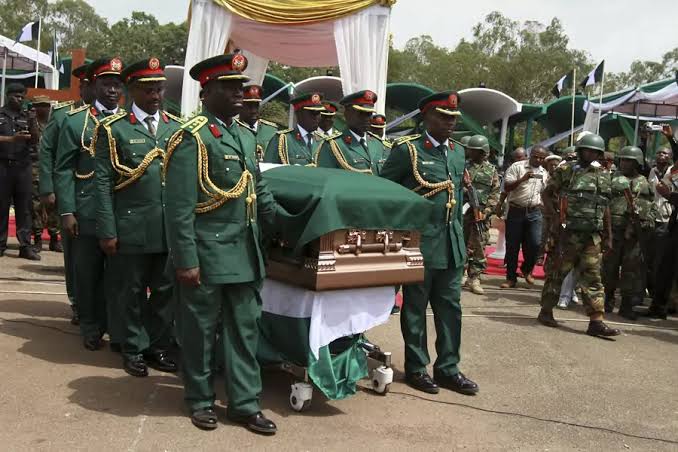 Finally, teaching the history of the war in schools is an effective way to purge our region of some of the conditioning and sentimentality that has fueled the regression we suffer especially in the area of security. The youths especially those who did not witness the war have been handed down traumas and stigmatization without a corresponding truth. Nature abhors vacuum and Igbos need corporately accepted memories to believe in. I think that the insecurity we experience now is partly caused by this lacuna which has blurred the lines between secessionist agenda and organized crime in the region.
Finally, teaching the history of the war in schools is an effective way to purge our region of some of the conditioning and sentimentality that has fueled the regression we suffer especially in the area of security. The youths especially those who did not witness the war have been handed down traumas and stigmatization without a corresponding truth. Nature abhors vacuum and Igbos need corporately accepted memories to believe in. I think that the insecurity we experience now is partly caused by this lacuna which has blurred the lines between secessionist agenda and organized crime in the region.
3. The truth remembered can be recalled and recollected at different times and through various mediums. Memories of the truth will not bring the healing and revitalization of our corporate psyche if it is not exported from the bosoms of academia. These truths must be woven into different mediums and injected into society. It must be translated into different forms that appeal to different strata of the region, conveying soothing messages, and validating our existence as a people and as Nigerians whilst chiming the bells for a movement toward progressive frontiers. The truth can be reflected in our architecture, museums, memorial days, plaques, observances, art, monuments, conferences, and symposiums aimed at reminding us that our experiences matter and that there is so much positivity that can propel us to greater frontiers.
4. The recollection should communicate altruistic values. The purpose of preservation of memory and memorialization is not fulfilled if these efforts do not condition our society to pick up the lessons learned and strive for more excellence. The concept of memory (Ncheta) must reconnect Igbos with their authentic identity, history, and values before the war disrupted that order. It must remind us of the lessons of the war and urge us to proudly embody these identities as we engage in the politics of thriving in Nigeria as Nigerians. This is wholesomely communicated in the phrase “Afamefuna”. The memories of the war must communicate a determent from ignoble activities and serve as an ethical guide to prosperity and sustainable growth.
The importance of a corporate moral code that speaks to the peculiar challenges of the Ndi-Igbo following the violations we suffered in the war and the trauma, stigma, and marginalisation we continue to suffer cannot be over-emphasised. I find that the majority of our people have not let go of the mentality and tactics they had to imbibe to survive that war. The result is that first the average Igbo is at war with him or herself and is somewhat at a loss about what poise to assume in Nigeria of today. Effective memorialization torches our path and dispels this identity crisis slowly but steadily, over generations.
The Duty to Memorialize v. The Duty to Remember.
Speaking from a strictly legal sense, the duty to memorialize the war rests on the Federal Government of Nigeria. It stems from the duty which accrues on it to provide remedies for human rights violations committed during the war. However, Fifty-Two years later, one would not be wrong to say that this country carries on in denial of the perils the Igbo suffered during the war. The Phrase “No Victors, No Vanquished” has become the most popular fallacy of our time as the south-eastern region continues to suffer massive deficient representation in every critical place where power is brokered and policies are formulated in this country. This is a function of the marginalization we can all allude to and the passive-aggressive stands Ndi-Igbo have assumed when it comes to Nigerian Politics.
There is no better representation of the Federal Government’s attitude towards the legacies of that war and the plight of ndi-Igbo than the sorry state of the National War Museum in Umuahia. Robust conversations on the war rarely comes up as a national discussion. Issues concerning the Southeast are treated with condescension and the subject matter of the war at the national level has come to become a taboo that does not command the attention or empathy it should. Persons who dare to broach the subject at the national level are accused of sabotaging the national and territorial integrity of the country and are met with fates that weaken their political relevance at the center. In short, it has become inelegant, if not political suicide for one to attempt to raise the issue at the national level. Given the reluctance of the Federal Government to discharge its obligation to acknowledge the violations and continued suffering of the peoples of south-eastern Nigeria and indeed the defunct Biafra, the question is “Whose duty is it to remember?”
It is my opinion that Ndi Igbo cannot continue to live with the impunity and regression that the civil war brought upon them. We must begin to corporately make conscious efforts, committing our expertise and resources to healing the trauma we suffer collectively as a people. Onye ajulu aju adi aju onwe ya. To my mind, the answer to this quagmire lies in us. State governments and non-state actors can embark on or collaborate on memorialization projects. We must remember and as such I do not think it is wise for us to let the neglect we have been subjected to determine our fate. Ndi Igbo must begin to memorialize the victims of the Nigerian–Biafran war individually and collectively. The State Governments of the southeastern states must begin to commission more memorialization projects and make themselves available for partnerships with civil societies and the private sector. Individuals, families, communities, and businesses must begin to sponsor befitting projects that may be visual such as sculptures, monuments, or curated environments where conversations on memory can be held and documented.
As a people, we will not be able to memorialize the Nigerian-Biafra if we do not commit our financial resources to this movement. We must imbibe the culture of supporting the organizations that run memorialization projects such as museums, archives, symposiums, etc. This right here is the only way we can ensure the sustainability of the Memorialization of the war and enthrone a system where we can continuously harness valuable lessons from the legacies of that war. The government should also develop reward systems for corporate bodies that embark on or support such charitable projects. Financing the memorialization of the war may not be our legal duty in International Law but it is our moral and cultural duty. Indeed, it is a spiritual one that conforms with some philosophies in Igbo Odinani of Ime kwa mmuo, Ncheta, and Ozo emena. We must remember and corporately honour our histories and legacies and we must commit tangibly to this movement.
At this point, I must mention that there are some memorialization efforts in our region. The Centre for Memories Enugu is a good example. It provides education about omenani, the war legacies, and Igbo History. The Center educates the younger generations on the history and lessons learned from the war. It has hosted guests and tourists from different disciplinary backgrounds and nationalities. Most Importantly, the center provides education for children and hosts exhibitions for primary school pupils and secondary school students. With the impressive impact the Centre is making it struggles with funding and has struggled to stay afloat. This indicates that as a people, we are not yet aware of the importance of memorialization and have not begun to put our money where our mouth is. For the memorialization of the Nigerian-Biafran war to be effective and sustainable, we must bring our Igwebuike spirit to the fore and collectively finance these projects.
Memorialization and Better Civic Engagement.
Civic engagement refers to the active participation of individuals in their communities, societies, and government processes to contribute to the public good or common welfare. It involves citizens’ involvement in various activities aimed at improving society, promoting social justice, and influencing public policy. It is no news that the Igbos of south-eastern Nigeria have not featured optimally in the political scene in the country. Whilst the stigma from the war and the consequent marginalization Ndi-Igbo have suffered is substantially a reason for this, we would be dishonest to not admit to the fact that we exhibit a passive-aggressiveness towards National politics and Nation building. 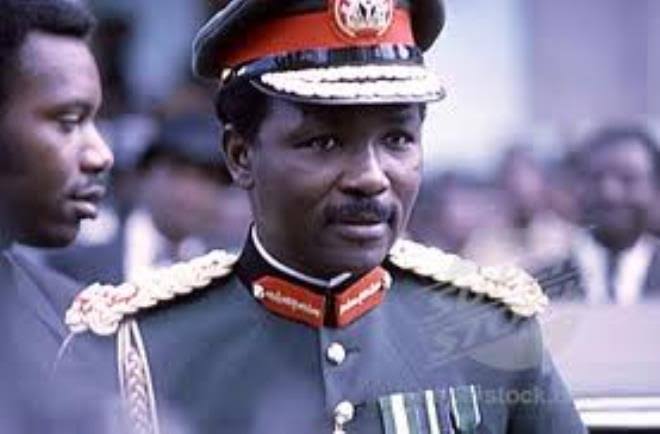 Though the Nigerian Social Contract is generally not a rewarding relationship for most of the citizenry at this time, it has been particularly frustrating for Ndi-Igbo given our unique history. There is indeed a place for anger, disappointment, trauma, and all the other spectrums of emotions we have felt corporately as a people. But to thrive in Nigeria as Nigerians, Ndi-Igbo have to stop the self-sabotage. This is even more so when one considers that one of the damning factors against the region is our massive underrepresentation in the military during the war. We need to get back to being strategic players in the Nigerian Polity.
Though the Nigerian Social Contract is generally not a rewarding relationship for most of the citizenry at this time, it has been particularly frustrating for Ndi-Igbo given our unique history. There is indeed a place for anger, disappointment, trauma, and all the other spectrums of emotions we have felt corporately as a people. But to thrive in Nigeria as Nigerians, Ndi-Igbo have to stop the self-sabotage. This is even more so when one considers that one of the damning factors against the region is our massive underrepresentation in the military during the war. We need to get back to being strategic players in the Nigerian Polity.
Recently, recruitment into the Nigerian Police Force was announced and the Anambra State recorded about the least entries and the use of the quota set out exclusively for it. If we do not have young entries from the southeast, it only follows that we are sabotaging our chances of producing leaders in that organisation. We need to make ourselves available for recruitment into the Nigerian Military and other key agencies of the government. Deliberate efforts to put forward younger candidates for federal appointments should be made so we stand better chances of functioning at the Apex in these establishments.
The weak civic engagement of the southeast also manifests in the low employment of tools and funds set out for the development of the region by the federal government. Establishments like the National Housing Fund, the Ecological Fund, the Bank of Industry and Bank of Agriculture, and even the National Health Insurance records remarkably lower engagements from the south-eastern states. Perhaps the most prolific disservice Ndi Igbo does to ourselves is our poor turnout during elections. In the last election, even with the viable candidacy of Mr. Peter Obi and the massive publicity that was given to the electoral process, there were still a lot of unclaimed PVC cards at collection centers all over the region.
Memorialization is a viable way for Ndi-Igbo to continually reappraise our political position in the country since the end of the war and recalibrate to active citizenship. It will remind us that though there is that war, the bigger tragedy is that as a people we resound defeat by not properly positioning ourselves to succeed, thrive, and lead in Nigeria of today. Memory and memorializing the war will teach our youth that in this era when we say ozoemena, we do not just allude to the aversion of war or conflict but also profess that never again will we make the mistakes that put us as people in a place of political disadvantage. Memorialization is a sustainable advocacy tool for better civic engagement and active citizenship in the south-east.
Civic engagement can take many forms. The following are some that are urgently required in South-Eastern-Nigeria today:
Voting: Participation in elections and exercising the right to vote is a fundamental form of civic engagement. It allows individuals to have a say in the selection of their representatives and the direction of government policies. Education and advocacy must continue in this regard. More southeasters must begin to view their vote and choices as viable tools in the political development of the region.
Volunteering: Engaging in volunteer work for community organizations, non-profits, or social causes is another aspect of civic engagement. Though Volunteering is not a way to earn income, it should be an attractive venture for ndi-igbo at his time because in contributing their time, skills, and resources to address local needs and improve the well-being of their communities, it provides the platform for them to understudy political and administrative processes and get a firm grip on the best practices and strategies in that terrain. Volunteering should be encouraged for younger persons so that they can imbibe the right political culture in their formative years.
Community Organizing: Organizing or participating in community events, rallies, or protests to advocate for social change, raise awareness about issues, or mobilize support for specific causes is a form of civic engagement. Community organizing empowers individuals to work collectively to address common concerns.
Public Advocacy: Speaking out on behalf of marginalized groups, advocating for policy reforms, or lobbying government officials to address social, economic, or environmental issues are forms of civic engagement. Ndi- Igbo need to further imbibe the culture of diplomacy and political negotiations in engaging with the other ethnic nationalities in Nigeria. Whilst public advocacy involves using one’s voice to influence decision-making and promote positive change, that voice must first be refined and backed up by our corporate goals as a people.
Participation in Public Discourse: Engaging in discussions, debates, or forums on important societal issues through social media, public meetings, or community gatherings is a way to contribute to public discourse. Interestingly this is a cardinal point where memory meets civil engagement. Recollecting the memories of the war through the sharing of perspectives, exchanging ideas, and listening to diverse viewpoints are essential civic engagements we must undertake regularly. These public discourses should also be designed to address demographics in our society who are typically neglected such as persons at the grassroots, rural areas, women, and people living with disabilities.
Overall, increased civic engagement will reflect the region’s commitment to actively participate in shaping the country as a whole. It plays a crucial role in rebuilding our confidence as stakeholders in the Nigerian State thus fostering a healthier democracy, promoting social cohesion, and addressing collective challenges.
Memory and Sustainable Development.
Sustainable Development is often defined as development that meets the needs of the present without compromising the ability of future generations to meet their own needs. This concept is widely accepted as the ultimate altruistic goal all societies should be in pursuit of. It is meeting a society’s developmental needs in a manner that does not damage elements of its progressive evolution.
Sustainable development rests on human, social, economic, and environmental advancement of society. The nexus between sustainable development and memorialization lies in their mutual reinforcement of healing and progress. Memorialization, through monuments, museums, and educational programs, preserves the memory of conflicts, fostering a collective acknowledgment of past atrocities that the region endured in the war. This process can drive social cohesion, ensuring that the lessons learned from past conflicts shape future policies. By honoring victims and educating communities, fostering a culture of peace and resilience which makes for a more harmonious society poised for sustainable development. This cultural foundation if created will support economic and social initiatives, make the region more attractive to investors, and ensure that development efforts are inclusive and sensitive to the needs of affected populations, ultimately enhancing the welfare of Ndi-Igbo.
Sustainable development is the development that is always chronologically ethical and relevant. It is earnest development, the kind of development that the southeast continues to desperately need and indeed in some states in proud pursuit of. We cannot truly aim at sustainable development if we do not carry with us a consciousness of our unique history and light our paths up with lessons learned. Memorialization provides measuring units with which we can periodically assess the quality of the development in the region and say for ourselves whether they address our past and present us with a befitting future.
Recommendations.
Here are some recommended memorialization projects.
1. Memorial Museums:
Establish museums dedicated to the history of the Nigerian-Biafran War, showcasing personal stories, artifacts, photographs, and historical documents.
Include interactive exhibits and multimedia presentations to engage visitors and educate them about the war’s impact.
2. Monuments and Memorials.
Erect monuments in key locations to honor the victims and veterans of the war.
Design memorials that incorporate traditional Igbo artistic elements, making them culturally significant and relatable.
3. Educational Programs.
Develop school curricula that include comprehensive lessons on the Nigerian Biafran War, emphasizing the importance of peace and reconciliation.
Organize workshops, seminars, and lectures with historians, survivors, and scholars to facilitate deeper understanding and dialogue.
4. Commemorative Events.
Hold annual events, such as memorial services, peace walks, and cultural festivals, to commemorate significant dates related to the war.
Encourage community participation in these events to foster a sense of collective memory and solidarity.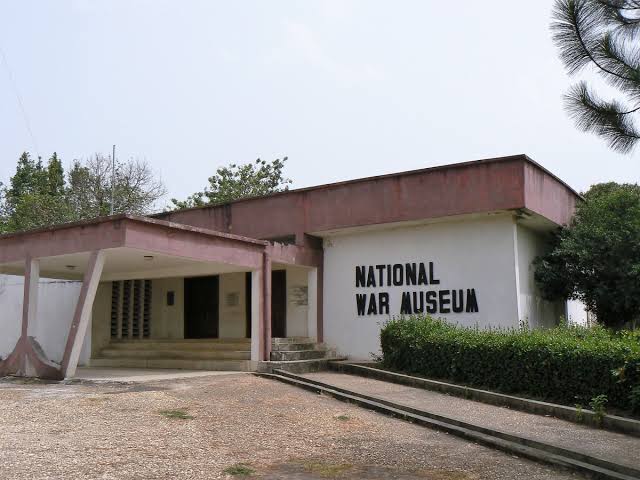
5. Digital Archives and Platforms.
Create online archives and digital platforms where people can access historical records, personal testimonies, and educational resources about the war.
Encourage the public to contribute stories and documents to build a comprehensive digital repository.
6. Community Centers and Peacebuilding Initiatives:
Establish community centers focused on peacebuilding and conflict resolution, offering counseling, support services, and educational programs.
Use these centers as venues for intergenerational dialogue, bringing together elders and youth to share experiences and promote mutual understanding.
7. Art and Literature Projects:
Support local artists and writers in creating works that reflect on the war, its aftermath, and the path to reconciliation.
Organize exhibitions, poetry readings, and theater performances that address themes of memory, loss, and hope.
8. Partnerships with NGOs and International Organizations: Collaborate with non-governmental organizations and international bodies to fund and implement memorialization projects.
Leverage their expertise and resources to ensure that initiatives are impactful and sustainable.
9. Preservation of Historical Sites:
Identify and preserve significant sites related to the war, such as battlefields, refugee camps, and historical buildings.
Develop these sites as educational and memorial spaces, providing contextual information and guided tours.
10. Inclusive and Participatory Approaches: Engage diverse community stakeholders, including war survivors, local leaders, and youth, in the planning and implementation of memorialization efforts.
Ensure that initiatives reflect the experiences and perspectives of all affected groups, fostering inclusivity and ownership.
These recommendations aim to create a multifaceted approach to memorialization that honors the past, educates future generations, and promotes healing and sustainable development in Southeastern Nigeria.

